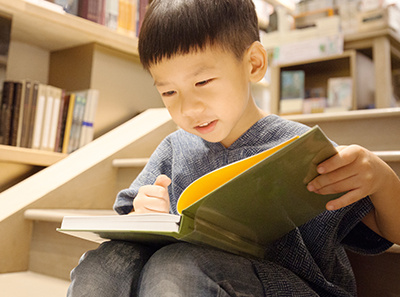
A change of environment and a break from routine offers great learning opportunities for children... and parents, too!
Holidays such as school term breaks are crucial for the advancement of brain development in children. The memories created during these holidays tend to be ingrained in the limbic system — the part of the brain that controls our basic emotions (such as fear and anger) and primal instincts (such as hunger and more).
In other words, these beneficial side effects are not just temporary — they actually help shape your child’s disposition, which is something that is important to us at The Learning Lab.
While it's great to give your child a break from schoolwork over the holidays, you don't want your child to forget what he or she has learnt throughout the year. In fact, the arrival of the holidays doesn’t mean that learning has to stop — it just means that there's time to expand on your child’s learning and to reinforce the skills he or she has developed.
To help your child maintain learning momentum during the school holiday, try some of the following ideas.

1. Make time for meaningful learning activities
Meaningful activities may count as different things to different parents and families, but perhaps one way of looking at this is to have activities that reinforce the lessons your child has learnt in school.
This could be something as simple as being in a natural environment where your child can witness the harmonious natural cycles of life.
In Primary 3 and 4, for instance, students learn about the characteristics and life cycles of plants, as well as the characteristics of mammals, birds, insects, fish, reptiles and amphibians.
You could help your child identify these living beings in a ‘real-time’ setting, consequently strengthening his or her memory of the subject.
Because contact with nature is proven to sharpen vision, concentration, curiosity and creativity, it works in your family’s favour to enjoy the great outdoors.
More importantly, being in a natural environment helps teach respect for our extraordinary planet and the ways all life are inextricably connected. This is a lesson your child can carry with him or her through life.

2. Check-in on your child’s daily activities
This period is an ideal time for your child to work on areas of weakness while revising what he or she has learnt in the first half of the year.
Start with looking through your child's past work. Analysing past errors and identifying the root cause(s) are important — it helps your child to reflect and review topics that were covered from the start of the school year.
Your child's teachers may have given him or her review worksheets as holiday assignments. These worksheets, which may be subject-specific, are great in helping to reinforce your child's topical knowledge and understanding.
A strong foundation will pave the way to a greater understanding of the newer topics that will be introduced in the upcoming terms.

3. Improve your child’s speaking skills
Children can be very inquisitive. Turn the tables around by asking precise questions and allowing them to figure out the answers for themselves.
Have clarity in communication while you play with words. For instance, rather than asking your child, “Did you sleep well?” you can instead say, “Where did your dreams take you last night?”
This is a creative way of teaching your child that there are many other ways to express himself or herself.
It is also helpful to be specific with your questions. For example, if you want to learn what happened in a situation you were absent from, you could say, “I noticed so-and-so. Did you know what happened?” instead of simply jumping into the scene and demanding to know what happened.
Remember that the weight and emphasis we put in words can have psychological consequences. According to psychological studies, when we structure our sentences by choosing to use positive words that invoke happy images, it decreases the number of unconscious negative thoughts.
Mindfulness in communication goes a long, long way.

4. Widen your child’s vocabulary and imagination with reading
Reading with your child is extremely helpful in nourishing your bond with your child. This activity expands your child's emotional intelligence, enriches his or her vocabulary, and also sparks creative imagination.
Reading and storytelling can foster a love of books and narratives, refine the distinction between reality and fantasy, understand the chain of events and consequences and strengthen intuition and social sensitivity.
But also, go beyond books. You can, for example, read packing labels together with your child when doing some grocery shopping or read street signs and billboards when you’re out and about. You can read menus in restaurants and cafes or even texts on people’s clothing. Comics and magazines with plenty of illustration are also interesting materials for developing minds.
Making time for this activity during the school break helps develop your child’s hindsight, insight and foresight through making visual observations and comparison.
Find out more about the enduring life-long skills that your child can pick up from reading and how to go about kindling a passion for reading in your child here.

5. Find ways to motivate your child
Check-in regularly to see where you can inspire your child to improve and give positive feedback and positive reinforcement whenever possible.
By taking an active interest in your child’s thoughts and activities, you are consciously teaching him or her the skill of self-observation and self-analysis. It also allows you to stay informed about your child’s mental health, emotional responses, social preferences and personality.
As your child progress through the academic year, he or she will have to manage busier schedules, tighter deadlines and heavier workload. This is why it’s important to ensure to help your child:
find joy in the day-to-day process
learn about the value and rewarding nature of independence
One way to do so is to explain the intangible rewards of achieving a goal or for good timekeeping. For example, you can get your child to finish a page of a colouring book by explaining the positive outcome of his or her hard work and commitment. Once he or she is finished the page, it can be gifted to grandma and grandpa, which would undoubtedly make them happy.
By doing this, you can give your child extra motivation to keep learning, keep exploring and keep finding joy in taking ownership of his or her work.

Enrich Your Child's Learning Journey from Home
Maintaining your child's learning momentum at home need not be a humdrum affair. This is a wonderful opportunity to create heart-warming memories and exciting learning experiences with your child.
Check out our collection of exclusive learning resources that includes fun activities for your child, useful guides, informative articles and more that can help your child learn at their own pace with the company of their loving family.
Check out our collection of exclusive learning resources that includes fun activities for your child, useful guides, informative articles and more that can help your child learn at their own pace with the company of their loving family.
Take your pick from the myriad of enjoyable and educational activities and guides such as:
Enrich Your Child's Learning Journey Today
We hope you find the above effective in enriching your child’s education and learning beyond the classroom. We believe that they are helpful in remembering what they've learned in school in the past term, at their own pace and with the company of their loving family.
These five points are also the same reasons why our curriculum is designed based on the following principles.
Relevant to every student
Cultivates the curiosity to learn
Develops the ‘whole’ person
Balances exam needs with life skills
Current and research-informed
School's out, but our workshops are a great way to liven up your child’s holidays. At The Learning Lab, we’ve prepared an exciting line-up of programmes to give your child an enjoyable yet enriching time this school break.
Having revised the theories and themes in your child’s Science curriculum, bring them to live with these fun experiments that allow your child to better grasp academic concepts.
Your child’s mission today is to create and present to you a showcase of what he or she has learnt in the past week. This guide will help your child pick up confidence for public speaking.
Your child’s learning journey continues at home. Encourage independent learning so that you can better balance working and managing your child's learning
from home.






